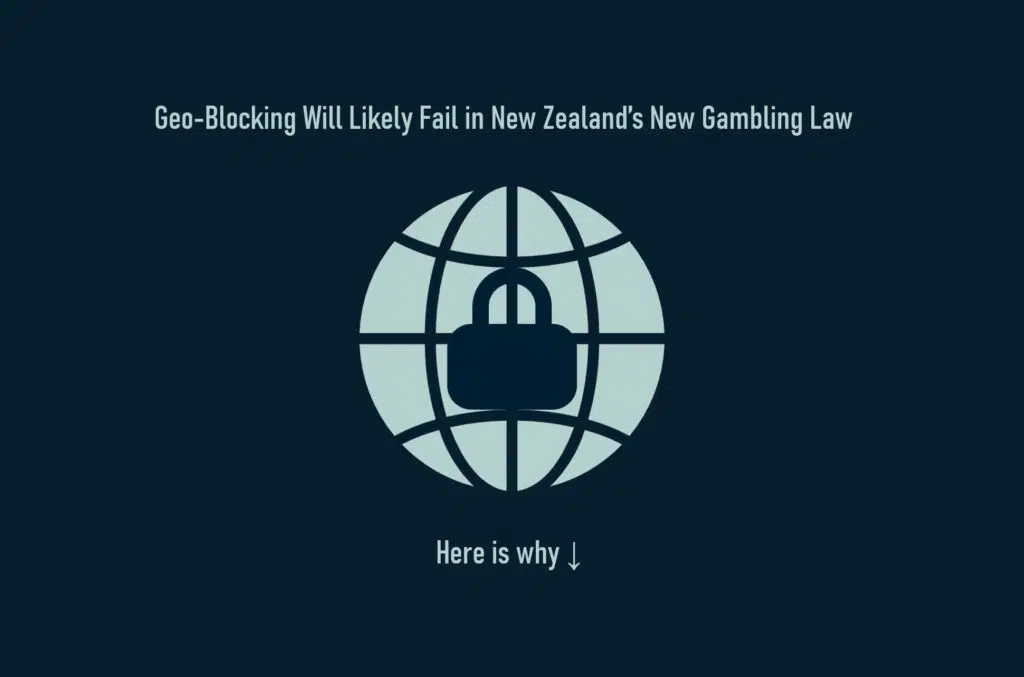Starting January 1, 2026, the New Zealand government plans to allow online casino advertising, but only from operators who hold a local gambling license. While this sounds like a step toward a regulated market, there’s a major flaw in the plan: geo-blocking.
The Plan: Limit Access Through Geo-Blocking
Because the government can’t legally stop people from visiting offshore casinos, they’re turning to geo-blocking—a system meant to prevent access to unlicensed sites based on the user’s location (IP address).
According to Gambling Insider, the idea is to block foreign casinos from being accessible to New Zealand users unless they are officially licensed in the country. Only 15 operators will be granted licenses, making the system easier to manage.
But here’s the problem: geo-blocking doesn’t actually work well.

1. Geo-Blocking Is Easy to Bypass
There are countless ways for players to get around geo-blocking, and most of them are free, fast, and completely legal for users:
- VPNs (Virtual Private Networks): Allow users to appear as if they’re accessing from another country.
- Proxy servers: Do the same thing, just less securely.
- Mirror sites: This is where things get clever.
Let’s say LeoVegas.com is blocked in New Zealand. When a New Zealand visitor tries to access the site, LeoVegas can detect that the IP is blocked and automatically redirect the user to leovegas2.com — a mirror site that looks and functions exactly the same, but isn’t on the government’s block list.
And no, this isn’t illegal for the casino. They’re not actively targeting New Zealand users — they’re just making it possible for visitors to find their way in, if they try.
2. The Global Track Record: It Doesn’t Work Anywhere
New Zealand isn’t the first country to try geo-blocking in gambling regulation. Other nations have already walked this path — and failed:
- Sweden launched its licensing system in 2019. Despite strict rules, over 41,000 Swedes search for “casino without Swedish license” each month, compared to just 2,600 looking for locally licensed casinos (data from bästonlinecasino.com).
- The same issue exists in Germany, the UK, and even parts of the USA. Geo-blocking hasn’t kept players away from offshore sites.
Why? Because players go where the best offers are, and unlicensed casinos usually have:
- Fewer restrictions
- Bigger bonuses
- Fewer verification steps
The Unintended Consequence: Money Leaves the Country
By making it hard for online casinos to get licensed (only 15 licenses), the government is unintentionally pushing players toward the black market — unregulated sites that don’t pay tax in New Zealand and don’t contribute to local causes.
This could also hurt community funding from physical gaming machines, which currently help support local sports clubs and charities. If more players go online — and offshore — that money dries up.
Our Take: Regulation Is Good — But This Isn’t It
We fully support safe, fair, and regulated gambling environments. But geo-blocking is not a real solution. It might block some casual users, but it will never stop determined players — and it risks handing more market share to unlicensed operators.
Instead, a more effective approach would be:
- A wider license framework that encourages competition
- Realistic advertising rules
- Strong support for responsible gambling tools
Without that, this system will likely go the way of many others: good intentions, poor results.